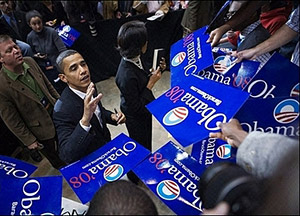 |
 |
 |
 Editorials | February 2007 Editorials | February 2007  
Until the War Ends ...
 Bob Herbert - NYTimes Bob Herbert - NYTimes


| | Presidential hopeful Senator Barack Obama, D-IL, and his wife Michelle sign autographs following a rally at the Hilton Coliseum of Iowa State University, in Ames, Iowa. Obama took to the ice-bound campaign trail, a day after launching his 2008 White House bid with a vow to lead a generational drive to purge the cynicism from US politics. (AFP/Mandel Ngan) |
Almost all the talk about the 2008 presidential election is about the horse race: Who's up? Who's down? Can Hillary hold her lead? Can a pro-choice, pro-gay-rights candidate like Rudy Giuliani outrun a hawkish maverick like John McCain?

It's a sport. It's fun. Why spoil it by being too serious?

Senator Barack Obama, in his speech in Illinois Saturday formally launching his presidential bid, gave us an excellent reason for being serious:

Ladies and gentlemen, there's a war on.

After going through a litany of lofty goals for a new generation to strive for, including health care for all Americans, a rejuvenated public education system, an end to poverty and real progress in dealing with global warming, the senator offered a hard and simple truth:

"All of this cannot come to pass until we bring an end to this war in Iraq."

The war - which, in addition to its human toll, will ultimately cost $2 trillion or more - has put America in a straitjacket, precluding progress on a range of important issues that will only worsen with continued neglect.

The public seems to understand this. It was voters fed up with the war who snatched control of both houses of Congress from the Republicans in last November's elections. And they were the ones giving Senator Hillary Clinton a hard time in New Hampshire over the weekend.

While Senator Obama is pushing a plan to bring American combat troops home by March 2008 (and former Senator John Edwards is calling for an immediate withdrawal), Senator Clinton continues to dance on the war issue. "I know that there is a great deal of frustration and anger and outrage," she said on Saturday, "but we can't just wave a magic wand and make things change."

We've moved beyond the absurd when it comes to the war. President Bush responded to the antiwar sentiment in last November's election by escalating U.S. involvement in Iraq. Vice President Dick Cheney, lost in a zone of unreality, is blithely spreading the fantasy of "enormous progress." He may not have noticed that the last three months have been among the worst of the war.

The Democrats who benefited from the antiwar vote reacted to the president's thumb in the eye of the voters with their usual timidity. They've put their hearts and souls into a marathon effort to pass a nonbinding resolution opposing the troop surge. Be still my heart.

The bottom line is that nothing has changed. The horror stories continue to spew out of Iraq: the helicopters being shot down, the mass killings in marketplaces, the steady stream of U.S. soldiers returning in body bags.

We need to stop pretending that there is something sane about continued U.S. involvement in this ruinous war. We keep sending troops into the combat zone and they keep sinking ever deeper into the ancient Middle East sand. To keep sending young people off to die in a war that everybody knows is pointless is criminal.

On NBC's "Nightly News" last Friday the correspondent Richard Engel, traveling with a convoy of soldiers from the First Infantry Division, had a close call when a roadside bomb detonated several feet away. No one was hurt, and Staff Sgt. Chris Copley said into the camera, with a laugh and a hint of bravado, "It gets the adrenaline going a little bit, doesn't it?"

But Mr. Engel noted that when the convoy returned to its patrol base, Sergeant Copley and other soldiers were openly wondering, "What are they doing out here?"

It's a question that deserves a clear, straight answer, especially from their commander in chief and the politicians running for president. As the casualties mount and success seems more and more unlikely, a sense of resignation is spreading among U.S. troops.

Sergeant Copley told Mr. Engel: "It's pretty much almost a lost cause. Nothing it seems that we do is doing any good."

Mr. Engel said all of the soldiers he talked with believed it was "time to end this war." He closed his piece by telling Brian Williams, "Earlier in the week some of the soldiers I was embedded with were hit by a larger I.E.D. That I.E.D. tore the door off the Humvee and the soldier inside had to have both of his legs amputated."

Senator Obama's capacity for leadership will be tested in large part by whether he can get the country to rally around his crucial point - that all further progress on important issues here at home depends on whether we can find the will to extricate ourselves from Iraq. | 
 | |
 |



